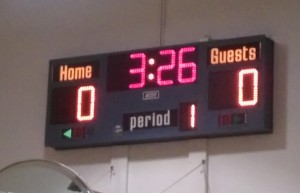
While coaching my daughter’s basketball team a few weekends ago, we ran into a formidable opponent. They were clicking on all cylinders; my girls seemed to be sleepwalking.
The upshot wasn’t pretty: early in the third quarter, the rout had climbed to 41-15 and we were well on our way to our third consecutive loss to start the season. The next time I glanced at the scoreboard, the clock was working just fine but the score had reverted to declaring what it stated at tip-off: 0-0.
The game went on as if not keeping score was a perfectly natural thing to do in the midst of a contest. I didn’t press the issue at the time, but a few days later conferred with the opposing team’s coach. He had inquired during a timeout with the scoreboard operator, who said that it was park district policy to turn off the scoreboard when one team was up by at least 25 points.
The `Grace Rule’ at Play
I checked out the league rules and, true enough, item #12 declares, “Grace Rule: Once a team reaches a 30-point lead, the score will be reset to zero and not kept from that point on. The clock will remain on.”
Aside from the slight jumping of the gun—we were down by “only” 26 points at the time—the scorekeeper was simply following protocol. So I have no beef with him.
Likewise, I am sure it was a well-meaning individual or set of individuals (and a crafty wordsmith) who came up with this notion to revert to zeroes on the scoreboard—and invoke that cute phrasing of “grace rule.” Well-meaning, but ill-advised.
After all, what’s the lesson we are implicitly teaching children when we turn off the score if it reflects a blowout in progress? That their psyches are so fragile, their potential trauma so extreme that we need to coddle them when the going gets tough, lest they develop poor self-esteem?

Furthermore, some of society’s most compelling stories are improbable athletic comebacks that astound and amaze. What kind of room exists for that turn of events when we introduce the artificial 0-0 equation?
The Underbelly of Good Intentions
You don’t need a master’s degree in metaphor-making to show this mindset’s absurdity and danger when applied to the Big, Bad World of Business or the School of Hard Knocks. Bottom lines are bottom lines and, in sports, a scoreboard without a score begs the question, “What’s the point of even calling it a contest?”
The opposing team’s coach and I successfully lobbied the park district supervisor to drop the 0-0 routine, should either of our teams find itself up (or down) by a similarly lopsided score in the future. Meantime, I’ve let my girls know that we’re going to continue to aim for victory. Or, at least, less crushing defeats.
So far, so good: the next game, we actually led after the first quarter, 8-6. After the girls reassured me that they didn’t feel the need to quit while they were ahead, we promptly fell apart. Down by six at the half, we trailed by as many as 23 points in the fourth quarter before a late rally closed the gap to 38-21.
Of course, we wouldn’t have known all of those ebbs and flows if the digits indicating the score had remained frozen on zeroes. And at the end, everyone in the gym knew who had won, who had lost, and the margin. All they had to do was look at the scoreboard.
Related Posts:
The Facebook Fan Squeeze: Four Ways to Respond
Aroldis Chapman and the Emotional Impact of His Triple Digit MPH Fastball
